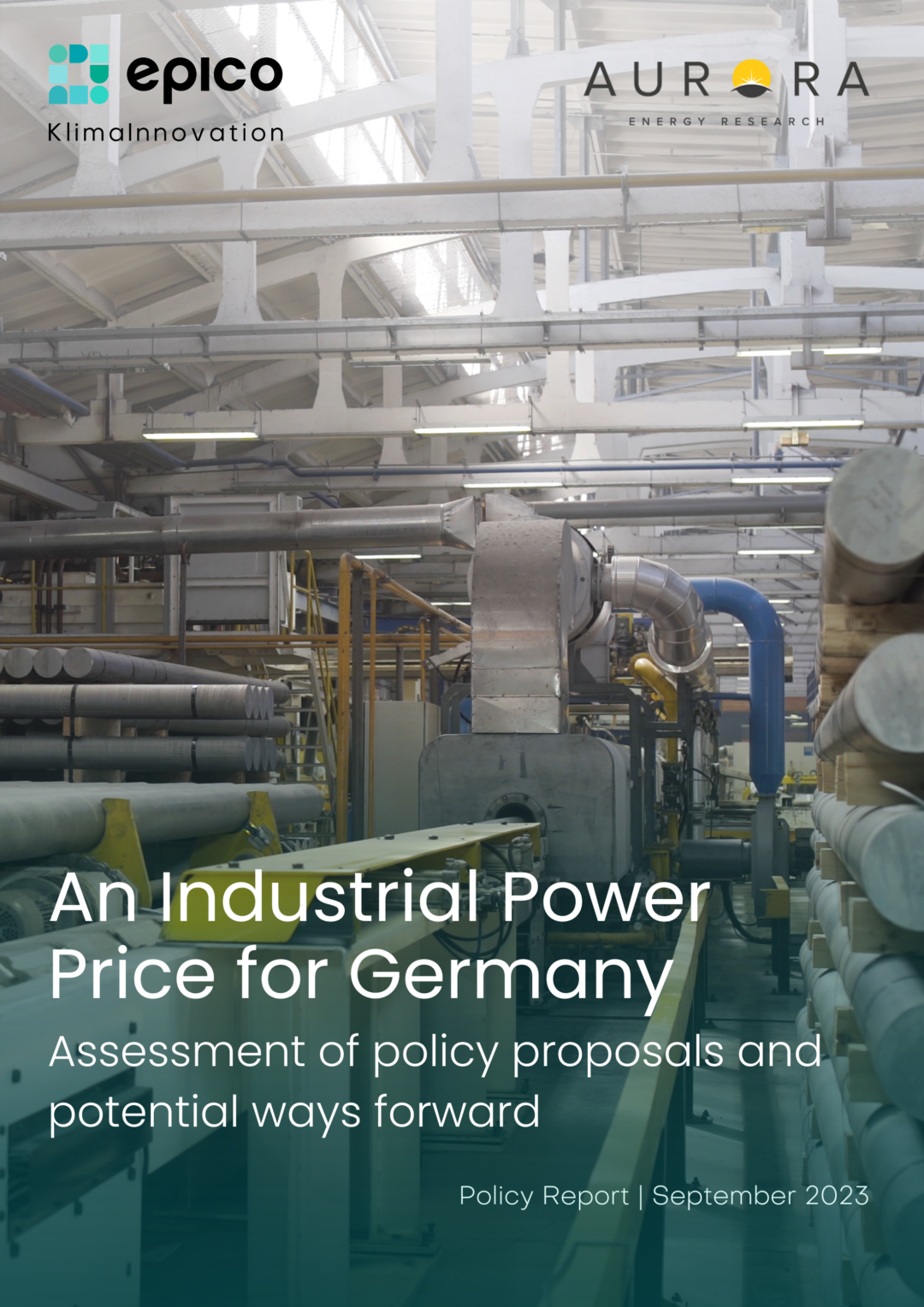The idea of introducing a subsidized power price for industrial offtakers to preserve international competitiveness of energy-intensive industries is debated in Germany after the publication of a proposal by the German Federal Ministry for Economic Affairs and Climate Action (BMWK). Key actors, such as the German Green Party (BÜNDNIS 90/DIE GRÜNEN) and parts of the German Social Democratic Party (SPD), argue for the introduction of the measure, while the Chancellor and the Minister of Finance oppose it.
In this policy report, EPICO KlimaInnovation and Aurora Energy Research, examine the proposed industrial power price, consisting of the short-term 'bridge power price' and a long-term 'transformation power price'. The industrial power price is also compared to other proposed alternatives, such as a recent "Eigenstrom PPA" suggestion by the Vice-Chairman of the FDP Parliamentary Group Lukas Köhler and a "StromPartnerschaft" (electricity partnership) proposal by the German Chamber of Commerce and Industry (DIHK).
This report assesses all proposed measures along three dimensions:
- overall efficiency and governance,
- policy impact on a well-functioning and efficient power market, and
- effects on individual industrial offtakers.
The BMWK’s proposal would risk leading to a prolongued subsidy that is not compatible with the EU’s regulatory framework. We should combine complementary measures to reduce the costs of electricity, incentivizing flexibility, market-oriented renewable expansion, and avoiding massive distortions. This could include production-based targeted short-term support for energy-intensive companies, with a clear exit pathway and a significant reduction of taxes, levies and grid fees specifically benefiting SMEs.
Renewables are the key to competitive power prices in the long-term. PPAs allow for better renewable financing and grant industrials access to cheap and green power. Thus, we believe that measures widening access to PPAs are effective tools for mitigating high power cost. Also, unlocking flexibility potentials of industry will be essential to reflect a changing power market, and ultimately reduce procurement cost.
Yet, there are options for Germany to remain an attractive industrial hub, also for energy-intensive sectors if a combination of measures is adopted.
The policy reports supports the BMWK's transformation power price's strengthening of the supply side of the power market via buildout of renewables. Measures contributing to a strong PPA market are the most favourable options on the supply side. Government guarantees for PPA projects or subsidized capital expenditure for PPA projects decrease financing costs and accelerate the buildout of renewables.
Altering taxes and levies could be possible short-term measures compatible with EU law, for example by reducing grid fees for PPAs, as mentioned in the proposal by Köhler. However, the study indicates, that such a measure would be of limited help for energy-intensive industries, already exempt from most non-wholesale components. Also, it would require payment of higher grid fees by other offtakers. A complementary option would be time-variant or locational grid fees, allowing a more effective use of transmission and distribution lines. Another option would be extending the "Spitzenausgleich" to avoid an increase of their electricity tax. This also has the support of the BMWK's Minister and Mr Lukas Köhler.
Production-based support is found to be a suitable option, providing multiple benefits: (1) It is compatible with EU market-rules, (2) requires no interventions in the power market, and (3) maintains the current form of incentives for flexibility and energy savings. Also, a blueprint for such support already exists in Carbon Contracts for Difference (CCfDs), and support levels could be determined efficiently via auctions.
Read here and download our Report.
External Content from epico
Please see the privacy policy of epico if you are loading external content.

